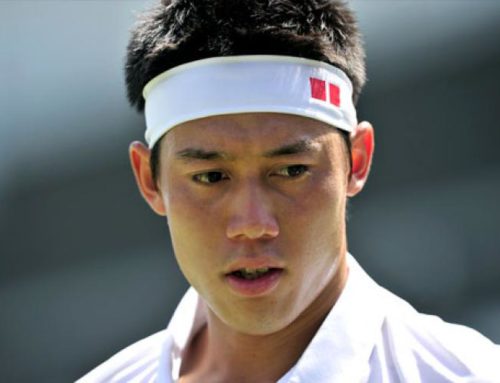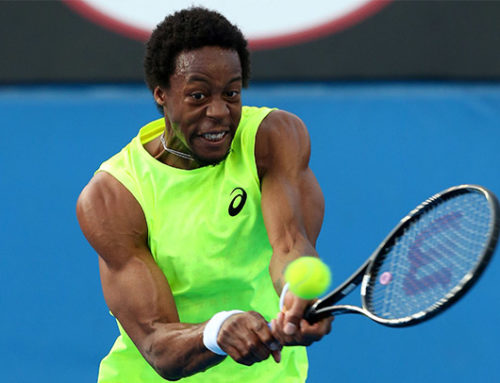Enough time has passed now since Cilic’s US Open victory to put his win in perspective. But before we can answer some of the pressing questions such as “Is Cilic a one-slam wonder?” it’s worth taking some time to look at exactly how he was able to win his maiden Slam in the first place. We’ll take a quick look at his year leading up to the tournament, his run through the draw and then a more in-depth analysis of his wins over Berdych, Federer and Nishikori.
Cilic’s 2014
There were no early indications from Cilic that he would break the stranglehold of the Big Four in 2014. Cilic came into 2014 after serving a 4 month suspension for a positive drug test (for the stimulant Nikethamide that was in glucose tablets he consuemed). He opened the year with a quarter-final loss in Brisbane to Nishikori, the man he would beat in the finals at Flushing Meadows. After second-round losses at Sydney and the Australian Open, Cilic made three straight finals in Zagreb, Rotterdam and Delray Beach, taking two titles in the process.
This brief flash of brilliance would fade into a string of early exits across the summer until a quarter-final showing at Wimbledon where Marin lost to Djokovic in five sets. Another early loss at Umag in Croatia to Tommy Robredo was followed by R16 defeats at the hands of Federer and Wawrinka in the US Open lead-up events in Toronto and Cincinnati. In all it was a solid but uninspired year coming into the tournament, and generally Cilic was playing at a level below that of his previous career peak of #9 back in 2010.
The Draw Through The Quarterfinals
Cilic’s US Open draw was kind. He opened his bid for the tournament against an out-of-form Marcos Baghdatis who retired half-way through the first set. Next he faced 163 ranked qualifier Ilya Marchenko whom he summarily dispatched in three surprisingly close sets. This win brought Marin face-to-face with his first real test of the tournament, Kevin Anderson. The big-serving South African proved a stern test that Cilic navigated with a tough four-set victory. Next for Cilic was Giles Simon, a counter-punching Frenchman whom Cilic had never defeated in four previous meetings. His five set win here was the tipping point of the tournament for Cilic, for as we’ll see the home stretch proved to be far easier in reality than it looked to be on paper.
Cilic vs Berdych
This match had all the makings of a dramatic slug-fest. Although Berdych lead their head-to-head 3-1 on hard courts, they were 4-4 overall. Both players possess big serves backed up with powerful groundstrokes off both sides. At their meeting just a few weeks prior at Wimbledon, Cilic had prevailed 7-6, 6-4, 7-6 – a tight straight sets affair. Berdych had taken the meeting before that on hard courts at Rotterdam. In short the signs were there for a close affair that could almost be decided by a coin toss.
It turned out to be anti-climatic in almost every regard. To say that Berdych came out looking flat would be an understatement. The opening set he struggled to put balls in play, and the 6-2 scoreline was flattering given his level of play. He didn’t look remotely competitive. Cilic snagged an early break in the second set and rode it out as Berdych slowly came alive. In the third set Berdych went up an early break but Cilic earned it back and they served their way into a tie-breaker which Cilic took after stringing together the last three points in a row.
Cilic wins 6-2, 6-4, 7-6 (7-4). It was a classic example of a slow start from Berdych, and although we saw him raise his level as the match progressed he had only come back from two-sets-down twice previously in his career. Once Cilic took the second set the writing was on the wall.
Cilic vs Federer
The Cilic-Federer semi-final looked to be a far more intriguing matchup. Federer has a long history of blunting the power of one-dimensional ‘big men’ and the general wisdom was that provided he had the legs after his five-set win over Monfils Federer should be able to wear Cilic down. Heading into the match Federer was 5-0 against Cilic and Federer’s summer form had been solid if not good. So what happened?
I had most of an article written about this match alone before deciding too much time had passed to make it worth posting. So, here’s the short version: Federer was a step slow and Cilic took time away. That Federer was fatigued coming into the match was both obvious and somewhat expected. Watching the points play out it was striking how many times Federer made it to a fairly routine defensive shot and failed to put the ball back in play. Where the Swiss would normally extend points effortlessly he was making (admittedly forced) errors at a rate that was unusual.
But this wasn’t just a match that Federer gave away. Cilic did everything he needed to. Although his first serve percentage wasn’t stellar (56%), Cilic served big when he needed to. Virtually every time Federer started to catch the scent of a break on the wind, Cilic would drop a couple of bombs and come out of his service games smelling like roses. Likewise Cilic kept the pressure up. One of the few ways to get to Federer is to rush him (which is difficult to do). Cilic brought pace off the ground, hit through the court and generally didn’t give Federer a chance to settle into groundstroke rallies. And finally he stayed the course. Just when Federer was looking like getting a foothold in the match, Cilic kept on him and pounced the moment Federer slipped.
In all the match was a disappointment in terms of the quality of tennis, but it was an interesting tactical battle nonetheless. Federer’s efforts to extend points and stay out on the court were rebuffed by the big hitting Cilic and he came through the match without a serious hiccup. Would the outcome have been different if Federer had been fresher? Probably, but that’s the joys of Grand Slam tennis. Your job is to win the tournament and that means not just winning each match, but doing so in a fashion that gives you a chance at winning the next one. In that regard Federer failed and Cilic succeeded and it takes nothing away from Cilic’s achievement that Federer looked fatigued.
Cilic vs Nishikori
In some ways this was a similar matchup for Cilic as he had with Federer. Neither Federer nor Nishikori had real hopes to outhit Cilic, and their game plans of necessity more revolved around extending rallies, keeping Cilic out on the court and working the point until they had the advantage. The complexities came down to the differences between Federer’s and Nishikori’s games. Whereas Federer’s forehand is generally a much more varied and potent weapon than Nishikori’s, Nishikori has a much more reliable backhand. As such Cilic didn’t have the same safe place to go on the court against Nishikori that he did against Federer (not that he really needed it much against Federer as it turned out). Against Nishikori Cilic would have to have a more balanced offense.
As it turned out the brutal path Nishikori faced to the final made much of it a moot point. After five set battles with Roanic and Wawrinka, and then a draining four set win over Djokovic, Nishikori clearly had little left in the tank. Like Federer he was a step slow and against the big-hitting Cilic that was never going to get the job done. Cilic managed to play a tidy match, in much the same way as he had against Berdych and Federer and that proved enough. It was, again, a disappointing match in terms of the quality of tennis. To many observers it may have seemed an overwhelming performance of firepower from Cilic, but the reality is that he was never forced to play great tennis.
In Summary
Not all Grand Slam championship wins are equal. Had Nishikori prevailed it would have undoubtedly been a more impressive performance than Cilic’s given Nishikori’s significantly tougher draw. However that’s the nature of tennis tournaments – you don’t get the draw you want, you get the draw you get. Cilic did everything that was required of him to win the tournament. In this case, it proved to be a rather disappointing home stretch as in none of his last three matches did he have to play great tennis. Good was good enough and that’s what Cilic did. It would have been nice to see Berdych bring the focus, or Federer/Nishikori the energy to be able to truly push Cilic from the quarter-finals onwards.
This is not to cheapen Cilic’s win. It may well be that Cilic was in a place physically and mentally to sustain great tennis over the final three matches of the tournament but we’ll never know. It is hardly his fault that none of his final three opponents was up to the task of actually making him do that. Regardless of how those matches played out, Cilic is the 2014 US Open men’s singles champion and it will be interesting to see how he handles the heightened expectations moving forward. the early bet is that he is a one-slam wonder – the product of a hot streak combined with a lucky draw. Whether or not this is true time will tell.

